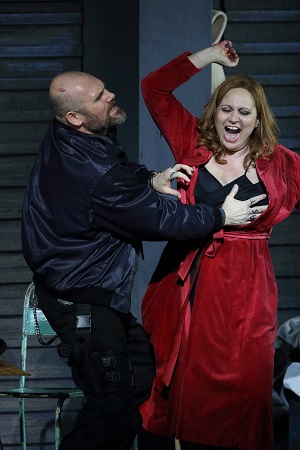Whether in the pit or on stage, we were in hands far better, far more
musical, than ‘safe’. One would have to travel far and wide to hear
superior orchestral playing in Puccini, or indeed anything else, than from
the Bavarian State Orchestra - and even then, one might well fail. Its
lengthy experience in Wagner truly paid off, the composer’s renewed - not
that it ever really vanishes - fascination with Tristan und Isolde
there for all to hear: not just as superficial similarity, but as something
more generative. For that and much else, the incisive, comprehending
conducting of James Gaffigan deserves high praise indeed. Equally apparent
here, especially in darker passages, was the related yet distinct haunting
of Pelléas et Mélisande and, more broadly, Debussy’s
music. It was Allemonde above all, though, that seemed to inspire the
(apparent) workings of fate. Gaffigan captured to a tee the ‘American’,
almost Gershwin-like character of the opening bars, proving himself - and
the orchestra - distinguished guides to all of the score’s twists, turns,
and transformations in between.
The principal trio of singers proved equally distinguished, unquestionably
Wagnerian guides to the work’s course. Anja Kampe was, thank goodness, no
goodie-two-shoes Minnie. In a more flesh-and-blood portrayal than I recall,
this was a conflicted woman with, yes, much good in her, but also a beating
heart that could take her to places unsafe, unwise, maybe even unwarranted.
More than once, I was put in mind of her Kundry (
with Daniel Barenboim, in Dmitri Tcherniakov’s magnificent production
). I seem endlessly to repeat myself when it comes to performances from
Brandon Jovanovich. I am certainly not prepared, however, to vary just for
the sake of variation. His performance as Dick Johnson was everything we
have come to expect from this intelligent, committed artist, as
dramatically powerful as it was verbally acute, as sweet-toned as it was
virile. John Lundgren’s Jack Rance was just as impressive: dark, malign,
but also comprehensible, no cardboard-cut-out villain. From a fine
supporting cast, I should single out Tim Kuypers’s Sonora. I do not think
it is just the human agency of the role that has me do so; Kuypers made one
feel there was considerably more to it than that.
Andreas Dresen’s production of La fanciulla del West premiered in
March this year. (The opera’s first Munich outing, intriguingly, came in
1934, the city by then well and truly the Hauptstadt der Bewegung
.) It does not do anything especially interesting with the work, but nor is
it unthinkingly ‘traditional’, for want of a better word. A darker setting
- literally, as well as metaphorically - is provided for the action,
perhaps most notably for the first act at the Polka Bar. Mathias
Fischer-Dieskau’s set designs, Sabine Greuning’s costumes, and Michael
Bauer’s lighting are very much part of this. There were times when I wished
for something more probing, more critical, but at least Dresen steers well
clear of the folkloric. For my reservations remain concerning the work
itself, more precisely its dramaturgy, and I cannot help but wonder whether
a director might fruitfully contribute something more here.
Some are doubtless more important than others. One can get worked up about
the racism. It is well-nigh impossible for a thinking person in 2019 not at
least to cringe. But I am not sure that it especially helps, unless one
childishly rejects all art of the past on the grounds that it is not of the
present. Perhaps, though, something more might be done to address the
issue. It certainly is not here - but then, alas, Puccini tends more than
any other opera composer of stature to suffer from a lack of critical
stagings. The somewhat sprawling nature of the first act perhaps invites
greater intervention than we found here.
It is the close, however, that seems most urgently to invite a more
critical stance. If I find the happy ending unconvincing - Puccini is
surely better dealing with tragedy, and that includes the hollowest of
victories in Turandot - then that must, at least in part, pay
tribute to the expectations the composer has set up and indeed to his
playing with them. I wish Dresen had donea little more with the possibility
of undermining that ending. Jack’s fumbling reach for his gun is at best
half-hearted; then the curtain comes down, separating Minnie and Dick from
the rest. Nor do I think the score escapes charges of sentimentality here.
No matter: it is what it is, and perhaps one day I shall come to appreciate
it as many others clearly do. For now, the magnificently vile sadism of Turandot will continue to work its magic. Puccini’s wish for a
‘second Bohème, only stronger, bolder, and more spacious,’ seems
to me unrealised. Fanciulla is perhaps bolder, if only in
aspiration; it is certainly more spacious, if not to its benefit; it is
hardly stronger. There was no doubting, however, the strength of these
musical performances; in many respects, that was enough for now.
Mark Berry
Giacomo Puccini: La fanciulla del West
Minnie - Anja Kampe, Dick Johnson - Brandon Jovanovich, Jack Rance - John
Lundgren, Nick - Kevin Connors, Sonora - Tim Kuypers, Trin - Manuel
Günther, Sid - Alexander Milev, Bello - Justin Austin, Harry - Galeano
Salas, Joe - Freddie De Tommaso, Happy - Christian Rieger, Jim Larkens - Norman Garrett, Ashby - Bálint Szabó,
Wowkle - Noa Beinart, Billy Jackrabbit - Oleg Davydov, Jake Wallace - Sean
Michael Plumb, Jose Castro - Oğucan Yilmaz, Pony Express Rider - Ulrich
Reß; Director - Andreas Dresen, Conductor - James Gaffigan, Set Designs -
Mathias Fischer-Dieskau, Costumes - Sabine Greunig, Lighting - Michael
Bauer, Dramaturgy - Rainer Karlitschek/Lukas Leipfinger, Bavarian State
Opera Chorus, Bavarian State Orchestra.
Nationaltheater, Munich; Friday 26th July 2019.
